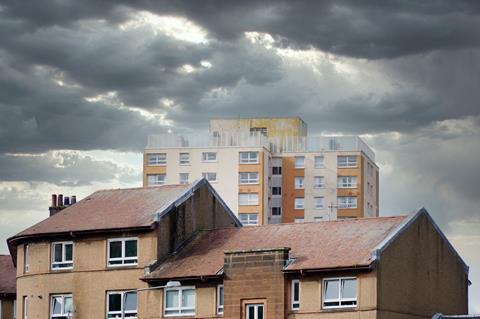Shelter Scotland and HACT have emphasised the social value of social housing, while social housing starts in Scotland fall to their lowest level since 2012/13
A study by Shelter Scotland and the Housing Associations’ Charitable Trust (HACT) has found that the average social value per individual was calculated at £11,027, based on changes reported by residents before and three months after moving into social housing.

The total social value created within three months of tenants living in social housing amounted to £1,060,049.
The social value of social housing in Scotland was assessed through wellbeing values, the primary direct impact on individual tenants, and the exchequer value, a secondary direct impact on the public purse.
The research calculated wellbeing values taking into account factors such as the affordability of rent, tenants’ ability to heat their households in winter, their employment status and proximity to greenspaces.
Male respondents reported an average social value of £12,988, compared to a social value of £10,848 for female tenants.
Residents who moved from an owner-occupied property and from another social housing property with a different landlord reported higher average rates of social value per individual compared to other tenancy routes.
Shelter Scotland and HACT’s three-year research project started in 2021. To date, 316 residents have completed a pre-occupancy survey, 129 residents have completed a three to six-month post-occupancy survey and 27 have completed a 12-month post-occupancy survey.
Scottish Government figures published earlier this week show that the number of social homes completed under the affordable housing supply programme is at the lowest level since 2020-21, while the number of starts is at its lowest since 2015/16.
Overall, there were 19,632 completions in the 2023/24 financial year and 16,404 new builds started.
The social housing sector built 5,043 homes and started building 3,500 homes in 2023/24.
This marks a decrease of 1,876 completed homes and 580 fewer starts, representing a 27% decrease in completions and a 14% decrease in starts.
These figures indicate that completions were at their lowest level since 2020/21, while starts were the lowest since 2012/13.
Director of Shelter Scotland, Alison Watson, said: “The continued decline in the number of social homes being delivered is the inevitable, and entirely foreseeable, consequence of repeated cuts to the housing budget.
>> See also: Lack of social rented homes in London costing £7.7bn in lost social value, say G15
>> See also: Social value in procurement needs assurance process to boost credibility, says HACT
“The research we’ve published shows that delivering social homes improves people’s lives and delivers tremendous value not only for social tenants but for the public purse as well”.
Watson added: “Investing in social housing means investing in people’s health and in our communities. Delivering more social housing is the only way to provide permanent homes for the 10,000 children in Scotland who are trapped in temporary accommodation. So, ultimately, investing in social homes is also investing in Scotland’s future.”
Michael Mclaughlin, head of social value at HACT, said: “We know that increasing housing supply is the key route to ending homelessness, however, what this year two research further evidences is that social housing tenancies play a particular role within this, through the provisions and wrap-around support that increases health, wellbeing, and resilience of those in most need.”
Furthermore, he noted that: “Social housing tenancies are driving improvements in social, economic and health outcomes in tenants, and where these are achieved there is huge capacity for significant preventative savings to wider society”.











No comments yet